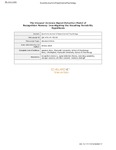The unequal variance signal detection model of recognition: Investigating the encoding variability hypothesis
| dc.contributor.author | Spanton, Rory | |
| dc.contributor.author | Berry, Christopher | |
| dc.date.accessioned | 2020-01-28T09:01:10Z | |
| dc.date.issued | 2020-08 | |
| dc.identifier.issn | 1747-0218 | |
| dc.identifier.issn | 1747-0226 | |
| dc.identifier.uri | http://hdl.handle.net/10026.1/15348 | |
| dc.description | No embargo required | |
| dc.description.abstract |
<jats:p> Despite the unequal variance signal-detection (UVSD) model’s prominence as a model of recognition memory, a psychological explanation for the unequal variance assumption has yet to be verified. According to the encoding variability hypothesis, old item memory strength variance (σ<jats:sub>o</jats:sub>) is greater than that of new items because items are incremented by variable, rather than fixed, amounts of strength at encoding. Conditions that increase encoding variability should therefore result in greater estimates of σ<jats:sub>o</jats:sub>. We conducted three experiments to test this prediction. In Experiment 1, encoding variability was manipulated by presenting items for a fixed or variable (normally distributed) duration at study. In Experiment 2, we used an attentional manipulation whereby participants studied items while performing an auditory one-back task in which distractors were presented at fixed or variable intervals. In Experiment 3, participants studied stimuli with either high or low variance in word frequency. Across experiments, estimates of σ<jats:sub>o</jats:sub> were unaffected by our attempts to manipulate encoding variability, even though the manipulations weakly affected subsequent recognition. Instead, estimates of σ<jats:sub>o</jats:sub> tended to be positively correlated with estimates of the mean difference in strength between new and studied items ( d), as might be expected if σ<jats:sub>o</jats:sub> generally scales with d. Our results show that it is surprisingly hard to successfully manipulate encoding variability, and they provide a signpost for others seeking to test the encoding variability hypothesis. </jats:p> | |
| dc.format.extent | 1242-1260 | |
| dc.format.medium | Print-Electronic | |
| dc.language | en | |
| dc.language.iso | en | |
| dc.publisher | SAGE Publications | |
| dc.subject | Recognition memory | |
| dc.subject | signal-detection theory | |
| dc.subject | encoding variability | |
| dc.subject | unequal variance | |
| dc.subject | old item variance | |
| dc.subject | memory strength | |
| dc.title | The unequal variance signal detection model of recognition: Investigating the encoding variability hypothesis | |
| dc.type | journal-article | |
| dc.type | Journal Article | |
| plymouth.author-url | https://www.webofscience.com/api/gateway?GWVersion=2&SrcApp=PARTNER_APP&SrcAuth=LinksAMR&KeyUT=WOS:000550683300008&DestLinkType=FullRecord&DestApp=ALL_WOS&UsrCustomerID=11bb513d99f797142bcfeffcc58ea008 | |
| plymouth.issue | 8 | |
| plymouth.volume | 73 | |
| plymouth.publication-status | Published | |
| plymouth.journal | Quarterly Journal of Experimental Psychology | |
| dc.identifier.doi | 10.1177/1747021820906117 | |
| plymouth.organisational-group | /Plymouth | |
| plymouth.organisational-group | /Plymouth/Faculty of Health | |
| plymouth.organisational-group | /Plymouth/Faculty of Health/School of Psychology | |
| plymouth.organisational-group | /Plymouth/REF 2021 Researchers by UoA | |
| plymouth.organisational-group | /Plymouth/REF 2021 Researchers by UoA/UoA04 Psychology, Psychiatry and Neuroscience | |
| plymouth.organisational-group | /Plymouth/Users by role | |
| plymouth.organisational-group | /Plymouth/Users by role/Academics | |
| dc.publisher.place | England | |
| dcterms.dateAccepted | 2019-12-19 | |
| dc.rights.embargodate | 2020-1-29 | |
| dc.identifier.eissn | 1747-0226 | |
| dc.rights.embargoperiod | Not known | |
| rioxxterms.versionofrecord | 10.1177/1747021820906117 | |
| rioxxterms.licenseref.uri | http://www.rioxx.net/licenses/all-rights-reserved | |
| rioxxterms.type | Journal Article/Review | |
| plymouth.funder | Models of Explicit and Implicit Memory: Linking Priming, Recognition, and Source Memory::ESRC |


